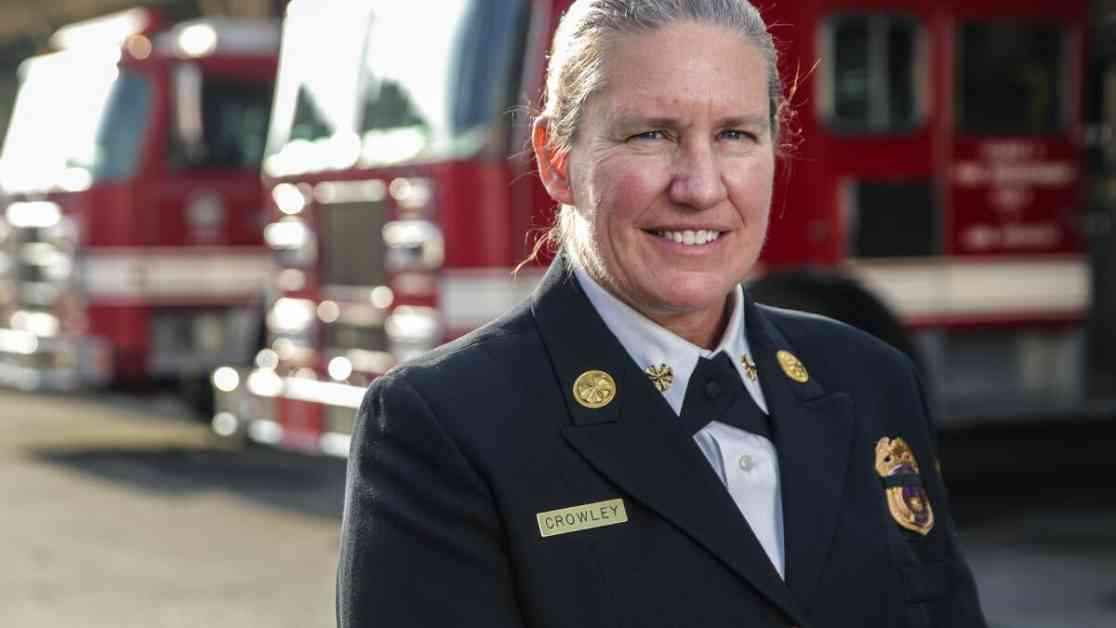Former Los Angeles Fire Chief Kristin Crowley is taking a bold step by appealing Mayor Karen Bass’ decision to dismiss her due to her handling of the devastating wildfire that ravaged Pacific Palisades. The appeal, which hinges on the approval of 10 out of 15 City Council members, faces an uphill battle. Despite the slim chances of success, this move is set to stir further public turmoil for Bass, who has been grappling to regain her political ground since the start of the Palisades fire on January 7.
Public Turmoil and Political Maneuvers
Crowley’s ousting by Bass came less than a week before her appeal, with the former chief criticized for failing to pre-deploy engines in light of severe wind forecasts and for purportedly declining to partake in a post-fire assessment. In a bid to seek reinstatement, Crowley’s email to City Council members referenced the City Charter section that grants her the right to appeal her dismissal.
Bass’ spokesperson, Zach Seidl, affirmed Crowley’s right to appeal, setting the stage for a series of political maneuvers. Council President Marqueece Harris-Dawson, a staunch supporter of the mayor, initially moved to expedite the process in a bid to minimize disruption. However, the scheduling of a special council meeting within 24 hours notice, a sharp departure from the customary 10 a.m. sessions at City Hall, drew criticism from various quarters. The United Firefighters of Los Angeles City Local 112 condemned the move as an attempt to downplay public scrutiny and accountability.
Councilmember Monica Rodriguez, advocating for Crowley’s reinstatement, pointed out that the meeting was scheduled on a day she had a prior excused absence, suggesting an effort to stifle public participation and transparency. Amid mounting criticism, Harris-Dawson eventually rescheduled the appeal vote for the following Tuesday, emphasizing the need for a fair and prepared hearing.
Competing Pressures and Political Fallout
As the appeal process unfolds, council members find themselves caught between conflicting interests. The influential firefighters union, backing Crowley and wielding considerable influence at City Hall, poses a significant factor. However, challenging the mayor’s decision could have ramifications on their political careers and legislative agendas. Meanwhile, Bass faces the potential fallout from the public scrutiny surrounding her rift with the former fire chief.
Fernando Guerra, a political science professor at Loyola Marymount University, highlighted the delicate balance council members must strike. While the firefighters union’s support can sway decisions, defying the mayor may have long-term consequences. Ultimately, the public spectacle surrounding the dispute could tarnish Bass’ standing, even as Crowley’s appeal faces slim chances of success.
The City Charter grants the mayor the authority to dismiss department heads, including the fire chief, without council approval. However, Crowley’s right to appeal the decision to the council adds a layer of complexity to the situation. With a two-thirds vote required for reinstatement, the council has a limited window of 10 meeting days to address Crowley’s filing.
Before Crowley’s dismissal, Bass and her team criticized the former chief for failing to alert the mayor about the looming wind conditions before her trip to Ghana. The mayor questioned Crowley’s deployment strategies and accused her of sending firefighters home prematurely, exacerbating the crisis. Allegations that Crowley declined to participate in an after-action report further fueled the controversy.
While Crowley has defended her decisions, emphasizing the welfare of firefighters and communities, questions linger over the handling of the Palisades fire. The revelation that the LAFD delayed deploying additional resources until the blaze was out of control raised concerns about the department’s response. Former fire chiefs noted a contrasting robust reaction to a similar wind forecast in 2011, underscoring the need for a thorough review of the events leading up to the wildfire.
Union President Freddy Escobar condemned Bass’ decision, arguing that Crowley’s termination preempted the outcome of an ongoing state review. Praising Crowley for advocating greater resources for the Fire Department, Escobar lamented her dismissal as a consequence of speaking truth to power. As the appeal process unfolds, the fate of Crowley and the implications for Los Angeles’ firefighting capabilities remain uncertain.


